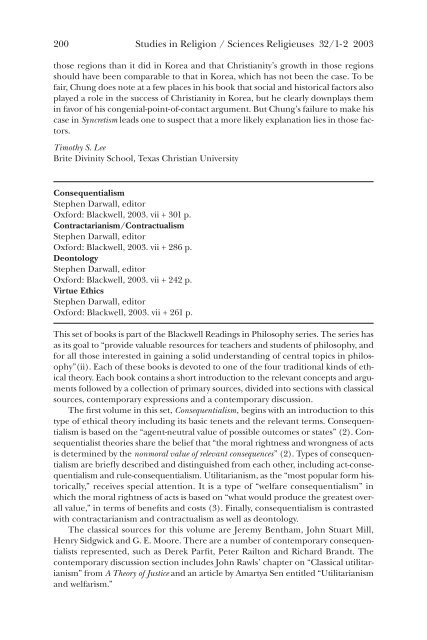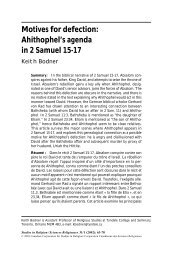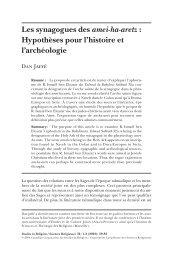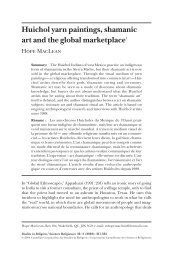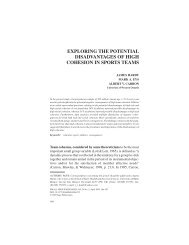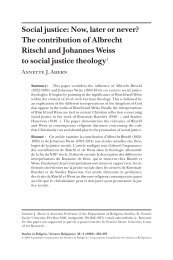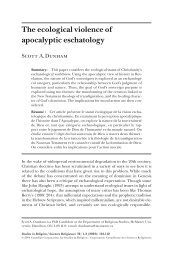Consequentialism; Contractarianism / Contractualism; Deontology
Consequentialism; Contractarianism / Contractualism; Deontology
Consequentialism; Contractarianism / Contractualism; Deontology
Create successful ePaper yourself
Turn your PDF publications into a flip-book with our unique Google optimized e-Paper software.
200 Studies in Religion / Sciences Religieuses 32/1-2 2003<br />
those regions than it did in Korea and that Christianity’s growth in those regions<br />
should have been comparable to that in Korea, which has not been the case. To be<br />
fair, Chung does note at a few places in his book that social and historical factors also<br />
played a role in the success of Christianity in Korea, but he clearly downplays them<br />
in favor of his congenial-point-of-contact argument. But Chung’s failure to make his<br />
case in Syncretism leads one to suspect that a more likely explanation lies in those factors.<br />
Timothy S. Lee<br />
Brite Divinity School, Texas Christian University<br />
<strong>Consequentialism</strong><br />
Stephen Darwall, editor<br />
Oxford: Blackwell, 2003. vii + 301 p.<br />
<strong>Contractarianism</strong>/<strong>Contractualism</strong><br />
Stephen Darwall, editor<br />
Oxford: Blackwell, 2003. vii + 286 p.<br />
<strong>Deontology</strong><br />
Stephen Darwall, editor<br />
Oxford: Blackwell, 2003. vii + 242 p.<br />
Virtue Ethics<br />
Stephen Darwall, editor<br />
Oxford: Blackwell, 2003. vii + 261 p.<br />
This set of books is part of the Blackwell Readings in Philosophy series. The series has<br />
as its goal to “provide valuable resources for teachers and students of philosophy, and<br />
for all those interested in gaining a solid understanding of central topics in philosophy”(ii).<br />
Each of these books is devoted to one of the four traditional kinds of ethical<br />
theory. Each book contains a short introduction to the relevant concepts and arguments<br />
followed by a collection of primary sources, divided into sections with classical<br />
sources, contemporary expressions and a contemporary discussion.<br />
The first volume in this set, <strong>Consequentialism</strong>, begins with an introduction to this<br />
type of ethical theory including its basic tenets and the relevant terms. <strong>Consequentialism</strong><br />
is based on the “agent-neutral value of possible outcomes or states” (2). Consequentialist<br />
theories share the belief that “the moral rightness and wrongness of acts<br />
is determined by the nonmoral value of relevant consequences” (2). Types of consequentialism<br />
are briefly described and distinguished from each other, including act-consequentialism<br />
and rule-consequentialism. Utilitarianism, as the “most popular form historically,”<br />
receives special attention. It is a type of “welfare consequentialism” in<br />
which the moral rightness of acts is based on “what would produce the greatest overall<br />
value,” in terms of benefits and costs (3). Finally, consequentialism is contrasted<br />
with contractarianism and contractualism as well as deontology.<br />
The classical sources for this volume are Jeremy Bentham, John Stuart Mill,<br />
Henry Sidgwick and G. E. Moore. There are a number of contemporary consequentialists<br />
represented, such as Derek Parfit, Peter Railton and Richard Brandt. The<br />
contemporary discussion section includes John Rawls’ chapter on “Classical utilitarianism”<br />
from A Theory of Justice and an article by Amartya Sen entitled “Utilitarianism<br />
and welfarism.”
Comptes rendus / Reviews of books 201<br />
The introduction to the second volume, <strong>Contractarianism</strong>/<strong>Contractualism</strong>, faces the<br />
daunting task of distinguishing between these two closely related types of ethical<br />
theory. They both claim that “moral principles are those that would be rationally or<br />
reasonably chosen or agreed to under certain ideal, counterfactual conditions” (1).<br />
<strong>Contractarianism</strong> is a response to the “collective action problem,” illustrated here by<br />
the Prisoner’s Dilemma, in which each party begins from his own self-interest and<br />
must find ways to cooperate that promote the interests of both. Darwall’s description<br />
of the Prisoner’s Dilemma is particularly clear and helpful to an understanding of this<br />
type of theory. The principles that are developed by contractarian ethical theories are<br />
those that would be rationally agreed upon from the initial perspective of promoting<br />
one’s own self-interest with the recognition that cooperation is mutually beneficial.<br />
The agreement to moral principles in contractualism, on the other hand, is based on<br />
the “moral ideal of equal respect” (4). An example of this type of theory is found in<br />
Kant’s concept of the “kingdom of ends” according to which individuals would agree<br />
to moral rules from a “common perspective as one free and equal person among others”<br />
(5).<br />
Selections from Hobbes, Rousseau and Kant provide classical sources, while<br />
David Gauthier, Gilbert Harman, John Rawls and T. M. Scanlon are included in the<br />
sections on contemporary expressions. Finally, a contemporary discussion by Gary Watson<br />
develops considerations in favor of contractualism.<br />
Darwall begins the introduction to the third volume, <strong>Deontology</strong>, by contrasting<br />
deontological theories with consequentialism. The basic difference is that deontologists<br />
reject the notion that moral standards are based on “agent-neutral” outcomes<br />
or states. Deontological theories claim that there are moral duties that are “agent-relative”<br />
(2). Darwall points out that contractualism is one form of deontological theory.<br />
Intuitionism is another form, in which the right-making and wrong-making factors<br />
in a moral situation are often described as duties. One problem recognized<br />
here is that we may sometimes be faced with conflicting duties. Although there is no<br />
fundamental principle to use in resolving such conflicts, W. D. Ross does provide a<br />
method that involves reflecting on the morally relevant features of the situation and<br />
how these interact with each other.<br />
The classical sources for deontology include three selections from Kant, one<br />
from Richard Price and one from W. D. Ross. A variety of essays by philosophers such<br />
as Robert Nozick, Thomas Nagel, Judith Jarvis Thomson and Christine Korsgaard<br />
make up the section on contemporary expressions.<br />
The absence of a discussion of Kant in this introduction is somewhat puzzling.<br />
There is a footnote directing the reader to the introduction in the volume on contractarianism/contractualism,<br />
where Kant’s idea of the kingdom of ends is given as<br />
an example of a contractualist ethical theory. However, Kant is not mentioned in the<br />
introduction to this volume on deontology until the list of readings. This seems very<br />
odd since Kant’s theory is normally considered to be the primary example of a deontological<br />
ethical theory. Some mention of the other formulations of the Categorical<br />
Imperative, the principle of universality and the principle of humanity, would have<br />
been useful and appropriate here.<br />
The introduction to the final volume in this set of books, Virtue Ethics, begins by<br />
pointing out that consequentialism, contractarianism, contractualism and deontology<br />
are all moral theories because they address questions of right and wrong conduct<br />
(1). Virtue ethics, on the other hand, is primarily about character. For example,


